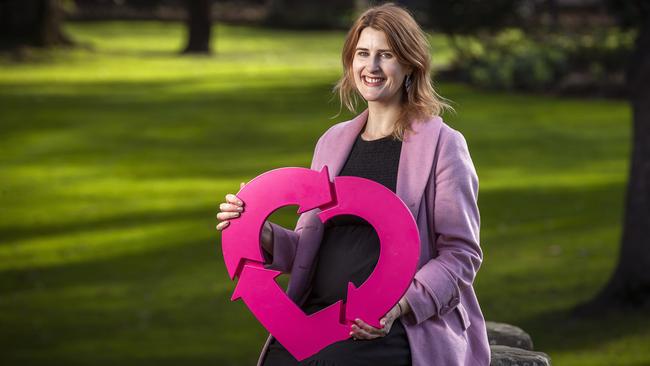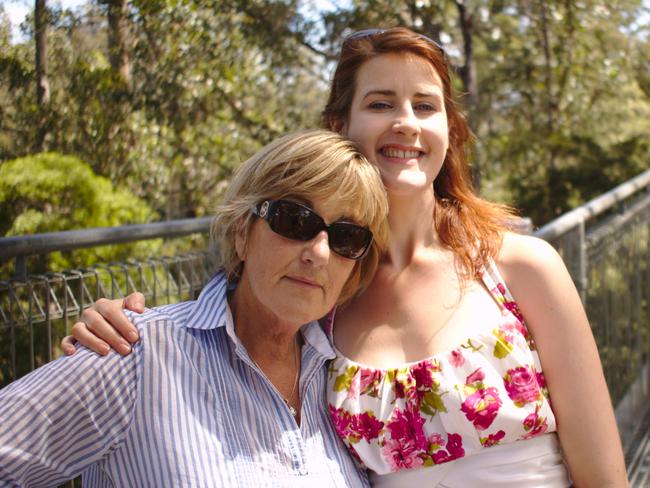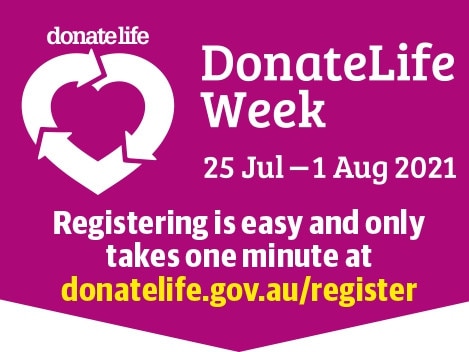Why your family needs to know now if you’re willing to donate your organs
DonateLife’s Great Registration Race is underway – and restricted living presents the perfect moment to raise organ donation with those family members who will have the final say.

SmartDaily
Don't miss out on the headlines from SmartDaily. Followed categories will be added to My News.
Families around the country are again resorting to video calls to stay connected but opportunity knocks to lock in a special and critical conversation.
The pandemic is the ideal time to make sure you are registered as an organ donor.
As DonateLife Week 2021 gets underway, the national organ and tissue service’s Great Registration Race is on amid news that registrations have dropped since the start of the Covid crisis.
The Organ and Tissue Authority (ATO) national medical director, Associate Professor Helen Opdam says lifesaving organ donations were also down 16 per cent in 2020.
And with 1800 Australians on the organ transplant wait list, Opdam says, “We need more donors.”
WHY IT HAS DECLINED
“We know that this period of time has been incredibly tough for many and it’s likely that people have had other concerns – health issues, employment and education, navigating lockdowns,” she says.
DonateLife’s 2020 donation and transplant activity report reveals that donation requests were made to 1170 families last year – but only 680 families said yes.
That consent rate of 58 per cent, coupled with a May 2021 YouGov study showing just four in 10 Australians understand that someone’s intention to become a donor can be overruled by next of kin, makes a compelling case for families knowing in advance where their loved ones stand.
“The biggest problem is families not knowing what their loved one wanted, in which case half decline organ donation,” Opdam says. “Nine in 10 families consent when their family member had registered to donate.”
Many people also don’t realise that so few of us will ever be asked to donate a deceased loved one’s organs because the right circumstances are so rare – only approximately 2 per cent of people who die in hospital can become organ donors. That’s because organs need to be working well to be viable for transplantation, so donation is only possible when a person dies in hospital – usually in intensive care on a ventilator.
“This typically occurs after a very severe and sudden stroke, trauma or other illness,” Opdam says. “We, our family members, and those we love are each … more likely to need a transplant than die in the circumstances where donation is possible.”
TACKLE IT NOW
DonateLife organ donor specialist Guy Vanderkelen is with families in that difficult moment and acknowledges it’s a very sensitive experience, made more challenging by “always happening in the face of acute grief.”
“We try to share information with them about organ donation – how rare it is, the benefits through organ donation not just for transplant recipients but also the family of the potential organ donor, because we know they receive support from the ICU and organ donation specialists.
“Also the benefit to them in supporting the wishes of their loved one,” he says.

IT SAVES LIVES
Indeed, knowing each other’s wishes could help save multiple lives: last year 463 deceased organ donors and their families saved and transformed the lives of 1270 organ recipients.
And judging from The Australian/Vogel’s Award-winning novelist Kate Kruimink’s experience, a brief chat while cooking a family meal is fundamentally all it takes to learn how your loved ones feel.
Kruimink’s mum Karen briefly mentioned to her three adult children over dinner one night that she wanted her organs donated if the unimaginable happened. It was that simple.
“She had been really well up until her death and we absolutely hadn’t expected her to die,” Kruimink says. “She was relatively young as well, so it was a real gift that she had given us that we could just say yes, without any kind of hesitation or any complication. We knew exactly what she wanted and it turned out to be a real source of comfort to us.”
The grieving family was surprised to discover they had the final say even though Karen was already on the donor register, which is why Kruimink – expecting her second child in November – is urging other families to have the chat now.
“We learnt that five people were the recipients of her donation,” she says. “I don’t know who they are, but I’m so happy that they’re still with us. It really has been a huge comfort to know that there’s meaning in Mum’s death.”

HOW TO REGISTER
There has never been a more urgent time in Australia for organ and tissue donors.
The good news is that all you need is your phone or a computer, a Medicare card and a minute to register.
The first step is checking whether you are registered. Go to donatelife.gov.au/check
Simply fill out the form with your details and if you are registered you will receive a pop-up notification.
If not, you will be registered as an organ and tissue donor once you click “submit”.
It is that simple. If you are not registered, it’s easy to do so.
1. Go to donatelife.gov.au/register
2. Input your Medicare card number, your name, date of birth, postcode and submit.
You can also join the Australian Organ Donor Register via your myGov account, the Express Plus Medicare App or by downloading then posting a new registration at servicesaustralia.gov.au/individuals/forms/nh007df
Originally published as Why your family needs to know now if you’re willing to donate your organs



